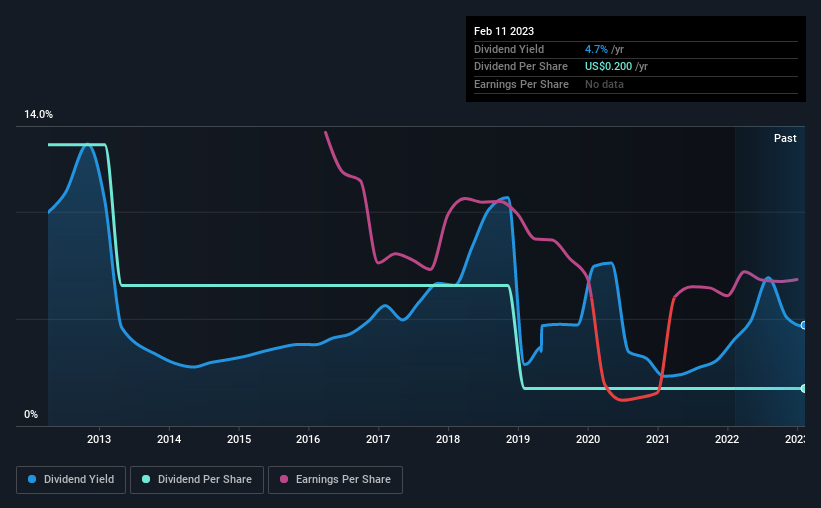Stock Analysis
- United States
- /
- Commercial Services
- /
- NYSE:PBI
Don't Race Out To Buy Pitney Bowes Inc. (NYSE:PBI) Just Because It's Going Ex-Dividend

It looks like Pitney Bowes Inc. (NYSE:PBI) is about to go ex-dividend in the next 4 days. The ex-dividend date is one business day before a company's record date, which is the date on which the company determines which shareholders are entitled to receive a dividend. The ex-dividend date is of consequence because whenever a stock is bought or sold, the trade takes at least two business day to settle. Accordingly, Pitney Bowes investors that purchase the stock on or after the 16th of February will not receive the dividend, which will be paid on the 14th of March.
The company's next dividend payment will be US$0.05 per share. Last year, in total, the company distributed US$0.20 to shareholders. Calculating the last year's worth of payments shows that Pitney Bowes has a trailing yield of 4.7% on the current share price of $4.25. Dividends are a major contributor to investment returns for long term holders, but only if the dividend continues to be paid. We need to see whether the dividend is covered by earnings and if it's growing.
Check out our latest analysis for Pitney Bowes
If a company pays out more in dividends than it earned, then the dividend might become unsustainable - hardly an ideal situation. Pitney Bowes paid out 95% of its earnings, which is more than we're comfortable with, unless there are mitigating circumstances. Pitney Bowes paid a dividend despite reporting negative free cash flow last year. That's typically a bad combination and - if this were more than a one-off - not sustainable.
Click here to see the company's payout ratio, plus analyst estimates of its future dividends.

Have Earnings And Dividends Been Growing?
Businesses with shrinking earnings are tricky from a dividend perspective. Investors love dividends, so if earnings fall and the dividend is reduced, expect a stock to be sold off heavily at the same time. Pitney Bowes's earnings per share have fallen at approximately 26% a year over the previous five years. Ultimately, when earnings per share decline, the size of the pie from which dividends can be paid, shrinks.
Many investors will assess a company's dividend performance by evaluating how much the dividend payments have changed over time. Pitney Bowes's dividend payments per share have declined at 18% per year on average over the past 10 years, which is uninspiring. While it's not great that earnings and dividends per share have fallen in recent years, we're encouraged by the fact that management has trimmed the dividend rather than risk over-committing the company in a risky attempt to maintain yields to shareholders.
Final Takeaway
From a dividend perspective, should investors buy or avoid Pitney Bowes? Earnings per share are in decline and Pitney Bowes is paying out what we feel is an uncomfortably high percentage of its profit as dividends. Generally we think dividend investors should avoid businesses in this situation, as high payout ratios and declining earnings can lead to the dividend being cut. This is not an overtly appealing combination of characteristics, and we're just not that interested in this company's dividend.
With that being said, if you're still considering Pitney Bowes as an investment, you'll find it beneficial to know what risks this stock is facing. We've identified 3 warning signs with Pitney Bowes (at least 2 which shouldn't be ignored), and understanding these should be part of your investment process.
Generally, we wouldn't recommend just buying the first dividend stock you see. Here's a curated list of interesting stocks that are strong dividend payers.
Valuation is complex, but we're helping make it simple.
Find out whether Pitney Bowes is potentially over or undervalued by checking out our comprehensive analysis, which includes fair value estimates, risks and warnings, dividends, insider transactions and financial health.
View the Free AnalysisHave feedback on this article? Concerned about the content? Get in touch with us directly. Alternatively, email editorial-team (at) simplywallst.com.
This article by Simply Wall St is general in nature. We provide commentary based on historical data and analyst forecasts only using an unbiased methodology and our articles are not intended to be financial advice. It does not constitute a recommendation to buy or sell any stock, and does not take account of your objectives, or your financial situation. We aim to bring you long-term focused analysis driven by fundamental data. Note that our analysis may not factor in the latest price-sensitive company announcements or qualitative material. Simply Wall St has no position in any stocks mentioned.
About NYSE:PBI
Pitney Bowes
A shipping and mailing company, provides technology, logistics, and financial services to small and medium-sized businesses, large enterprises, retailers, and government clients in the United States and internationally.
Undervalued with moderate growth potential.

